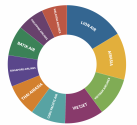Sorry If I am reposting this.
I would hope that COMAC is really careful in deciding who they sell to. Countries/Operators with limited ability/experience in operating aircrafts must not be tolerated. Aviation is a safety and perception business, and even one mishap can have a decade long impact on reputation. Better to focus on domestic Chinese market than go and sell C919s with subsidies to unexperienced players where chances of mishaps are higher.
From the practical standpoint, if the aim is to supply the domestic market first then they will not have capacity to export for a few decades. The projection is up to 3000 narrowbodies and regional jets in the coming decade. They are aiming for 150 C919 a year in 5 years (before 2030) but that to me is very ambitious and even half of that would be fantastic.
The main point here is there is no way COMAC can fulfill the domestic demand. Exports are not a financial necessity for COMAC any more than exporting HSR is for CRRC.
But that captive market also gives COMAC massive confidence to experiment with exports -- and getting feedback from global customers so that they are not developing in isolation. They not dependent on exports and can do things carefully..
Yes, I think you have a point in not having a MA60-like issue where aircraft were sold to small less established airlines which resulted in accidents. But the issue is the airlines not the country they operate in.
Nigeria Air is a national carrier. By definition, it should be better -- at least better supported -- than some of the smaller players that bought the MA60. It is encumbent upon COMAC to develop proper support and service.

